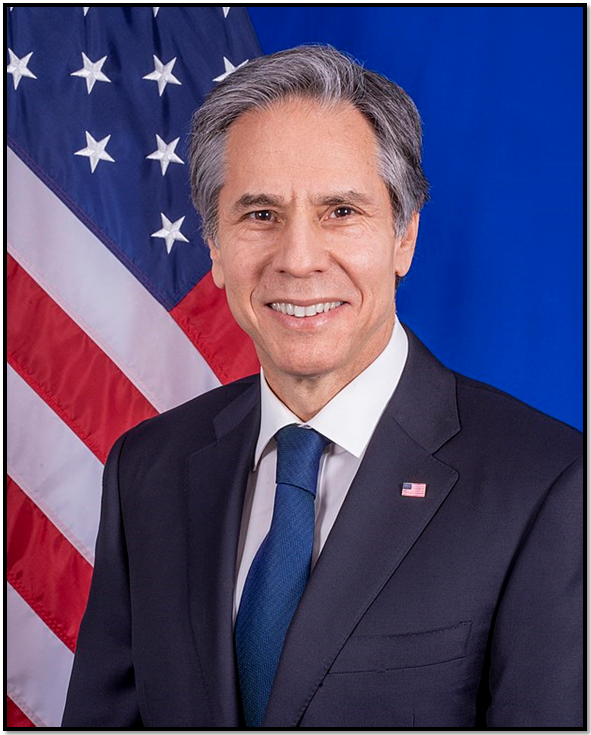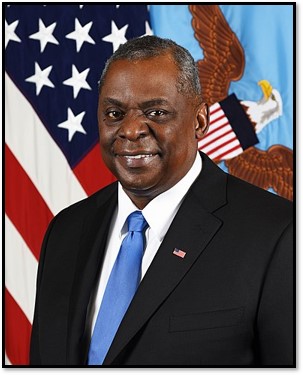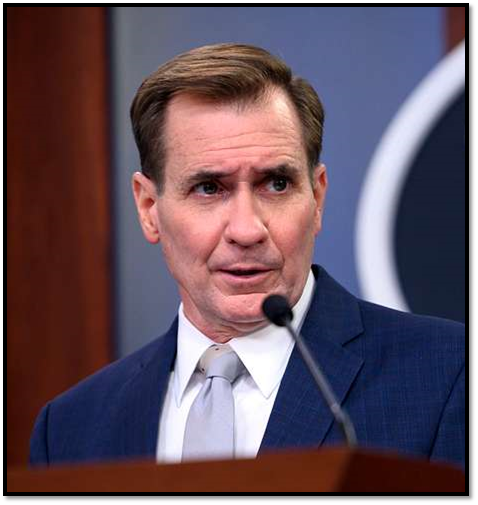On Jan. 28, 2024, three U.S. soldiers were killed and more than 40 injured in a drone strike on Tower 22, a military outpost in Jordan abutting the borders of Syria and Iraq. They were the first fatalities after more than 160 attacks on U.S. forces deployed in Iraq, Syria and Jordan since the Israel-Hamas War erupted in Gaza on Oct. 7, 2023. The attack was also the first on a base in Jordan. The Biden administration blamed Iranian-backed militias and vowed to respond. “Have no doubt — we will hold all those responsible to account at a time and in a manner of our choosing,” President Joe Biden told reporters. The following are remarks by senior U.S. officials.
President Joe Biden
To reporters on January 30:
Question: Have you made a decision on how you’ll respond to the attacks?
Biden: Yes.
Question: Mr. President, do you hold Iran responsible for the death of those three Americans?
Biden: I do hold them responsible in the sense that they’re supplying the weapons to the people who did it.
Question: Are you worried about a wider war in the Middle East?
Biden: I don’t think we need a wider war in the Middle East. That’s not what I’m looking for.
On January 28: “Today, America’s heart is heavy. Last night, three U.S. service members were killed—and many wounded—during an unmanned aerial drone attack on our forces stationed in northeast Jordan near the Syria border. While we are still gathering the facts of this attack, we know it was carried out by radical Iran-backed militant groups operating in Syria and Iraq…We will strive to be worthy of their honor and valor. We will carry on their commitment to fight terrorism. And have no doubt — we will hold all those responsible to account at a time and in a manner of our choosing.”
Remarks at a political event on January 28: “I want to point out that we had a tough day last night in — in the Middle East. We lost three brave souls in an attack on one of our bases. And I’d ask you for a moment of silence for all three of those fallen soldiers. And we shall respond.”
Secretary of State Antony Blinken

Remarks on January 30: “From the outset, we have been clear in warning that anyone looking to take advantage of conflict in the Middle East and try to expand it: Don’t do it. We’ve taken steps to defend ourselves and to defend our partners as well as to prevent escalation. And the President has been crystal clear: We will respond decisively to any aggression, and we will hold responsible the people who attacked our troops. We will do so at a time and a place of our choosing. At the same time, we remain focused on our core objectives in the region, both in terms of the conflict in Gaza and broader efforts to build truly durable peace and security…”
“We’ve made very, very clear from day one that we’re going to defend our people, we’re going to defend our personnel, we’re going to defend our interests, and that’s exactly what we’ve done. We’ve taken action, and significant action, to deter groups, to degrade their capabilities in Iraq, in Syria, in Yemen. At the same time, the President’s been very clear that we want to prevent broader escalation. We want to prevent this conflict from spreading. So we are intent on doing both – that is, standing up for our people when they’re attacked, while at the same time working every single day to prevent the conflict from growing and spreading. And that’s exactly what we’ll continue to do. It’s fundamentally what’s in the interests of the United States, what’s in the interests of the region, and I think what’s in the interests of the world…
“So the attacks that have taken place since October on our forces, on our personnel in both Iraq and Syria, have been conducted by groups that are aligned with Iran and indeed are supported by Iran, funded by Iran, equipped by Iran. And I would note that the presence of our forces in both Iraq and Syria has nothing to do with Gaza, nothing to do with the conflict that’s taken place since October 7th, since the horrific attacks by Hamas, and everything to do with making sure that ISIS doesn’t re-emerge. That’s why they’re there – something that Iran should share as an interest.
“But on the contrary, the groups that are aligned with it have been conducting these attacks…We do not seek conflict with Iran, we do not seek war with Iran, but we have and we will continue to defend our personnel and to take every action necessary to do that, including responding very vigorously to the attack that just took place. And as I mentioned, I’m not going to get ahead of where the President is; I’m certainly not going to telegraph the response. But as I mentioned, that response could well be multileveled, it could come in stages, and it could be sustained over time.”
Secretary of Defense Lloyd Austin
Remarks on February 1:

Austin: So this is a dangerous moment in the Middle East. We will continue to work to avoid a wider conflict in the region but we will take all necessary actions to defend the United States, our interests, and our people. And we will respond when we choose, where we choose, and how we choose....
We believe that this was done by an element of what is known as the Axis of Resistance, and these are Iranian proxy groups. And how much Iran knew or didn't know, we don't know, but it really doesn't matter because Iran sponsors these groups, it funds these groups, and in some cases, it trains these groups on advanced conventional weapons. And so I think without that facilitation, these kind of things don't happen.
Q: Have you seen any sign that China has been successful in pressuring Iran to rein in the Houthis in the Red Sea?
Austin: We have not. Again, what's happening in terms of close communications between leaders, don't know but we've not seen any visible evidence that they are encouraging or pressuring Iran to cause the Houthis to back off of what they've been doing.
Q: And then my second question, is there any discussion right now of withdrawing troops from either Syria or Iraq, especially given what has happened in the last couple of weeks?
Austin: What's happened in the last couple of weeks is not driving us to consider withdrawing troops from Syria. There are ongoing discussions with the Iraqi leadership about our future footprint in Iraq, and I think that's been fairly well publicized. The High Military Commission, we've taken the first steps in conducting those meetings. And so that will play out over time, so. It'll include discussions about our footprint going forward for sure. We're still doing the forensics, but most of the drones in the region have a connection with Iran. I don't think the adversaries are of a one-and-done mindset. And so they have a lot of capability, I have a lot more. And so, you know, we're going to do what's necessary to protect our troops and our interests.
Statement on January 28: “I am outraged and deeply saddened by the deaths of three of our U.S. service members and the wounding of other American troops in an attack last night against U.S. and Coalition forces, who were deployed to a site in northeastern Jordan near the Syrian border to work for the lasting defeat of ISIS. These brave Americans and their families are in my prayers, and the entire Department of Defense mourns their loss.
Iran-backed militias are responsible for these continued attacks on U.S. forces, and we will respond at a time and place of our choosing. The President and I will not tolerate attacks on American forces, and we will take all necessary actions to defend the United States, our troops, and our interests.”
Gen. Michael “Erik” Kurilla, CENTCOM commander
Statement on January 29: “We are deeply saddened by the loss of our three Army Soldiers who made the ultimate sacrifice while serving their country in Jordan. Our prayers are with these loyal and courageous Soldiers’ families, friends, and the entire 718th Engineer Company - we honor their selfless service and dedication to duty.”
John Kirby, National Security Council Coordinator for Strategic Communications

Remarks on January 29: “These troops were conducting a vital mission in the region, aimed at helping us work with partners to counter ISIS. And even as the Defense Department gathers more information about the attack, that mission must and will continue…The counter-ISIS mission is separate and distinct–indeed it has been longstanding and unrelated to our efforts to support Israel and to prevent a wider conflict in the region.
We do not seek another war. We do not seek to escalate. But we will absolutely do what is required to protect ourselves, to continue that mission, and to respond appropriately to these attacks…We’ll do that on our schedule, in our own time. And we’ll do it in a manner of the President’s choosing as Commander-in-Chief. We’ll also do it fully cognizant of the fact that these groups, backed by Tehran, have just taken the lives of American troops. And I think I’ll leave it there.”
In a briefing on January 29:
Question: Was this strike in Jordan fundamentally different than what American forces have been facing for months now? Does the U.S. believe this was a deliberate attempt at escalation?
Kirby: “It is fundamentally different now because we have three families who just got the worst possible news. That's different. And the scope of the wounded now -- more than 30 injured, some of them seriously -- that's also different. And it's possible that the number of wounded could go up. As you may know, traumatic brain injury symptoms, for instance, don't present themselves right away. And that is a very serious physical injury itself.
“But this wasn't the first drone attack on an American facility in the region. There have been others. And the fact that this one had lethal consequences doesn't mean that the previous ones weren't intended by these Iran-backed militias to have that same effect. This time they killed Americans, and they wounded a lot of them. It doesn't mean that they wouldn't have preferred that outcome in the past…
Question: How does the President balance a desire to not see escalation in the region with a decision to respond?
Kirby: That's the hard part of it, isn't it? I mean, that's what being Commander-in-Chief is all about, is acting in accordance with our national security interests --what's unacceptable to those interests and what has to be done to protect those interests.
There's no easy answer here. And that's why the President is meeting with his national security team, weighing the options before him. He'll do that, as he's done in the past, in a very careful, deliberate way so that our national security interests are best preserved.
Question: And has the administration communicated via a third party to Iran what -- the message that you're saying on TV about not wanting to have escalation?
Kirby: I am not aware, as you and I are speaking, that there's been a private message relayed to leaders in Iran. We have done that in the past. But as you and I are speaking right now, I'm not aware of such a mechanism…
Question: Is the President currently actively considering potential attacks inside Iran?
Kirby: We are not looking for a war with Iran. We are not seeking a conflict with the regime in a military way. And we're not looking to escalate here. This attack over the weekend was escalatory. Make no mistake about it. And it requires a response...
Question: Is it clear to you now whether the attack yesterday was at Iran’s direct urging or if this was more a proxy group that was mostly acting on its own?
Kirby: We know that Iran supports these groups. The degree to which they order and direct is something that, you know, intelligence analysts will look at. We know they support them, we know they resource them, we know they train them, and we know that they're certainly not discouraging these attacks, whether it's attacks by the Houthis, what Hamas did on the 7th of October, what Hezbollah has proven capable of doing, and now, of course, what these militia groups continue to do in places like Iraq and Syria and now Jordan.
Question: And just one other thing, if I may. You said earlier that this attack was escalatory but the United States doesn't want a war. Do you believe that Iran wants a war?
Kirby: That's up to Iran to decide and for Iran to speak to. I can't speak for the Supreme Leader. I wouldn't do that. Clearly, there's a calculus by at least the IRGC that conducting these attacks is worth the risk that they're taking. And we obviously are going to keep working to change that calculus.
State Department Spokesperson Matthew Miller
Briefing on January 30:
Question: As the administration is pondering over what to do, its next step, what is your response to critics that you might have wasted some time?
Miller: So I would say that when we say “at a time and place of our choosing,” you should focus on the word “our,” not “your.” It’s a time and place of our choosing, not yours. And as the Secretary also said, we’re not going to telegraph the response in advance, we’re not going to telegraph the nature of the response or the timing of the response, and no one should read anything into that about when, where, or how that response might take place. But as he said, it could be multi-level, it could come in stages, and it could be sustained over time.
Question: Can you speak to the objectives that you are trying to achieve here? Is it more than just ‘This is completely wrong and don’t do it again,” or it’s more than just sending a message? Are you going to go after troublemakers?
Miller: So, as the President said, we are going to hold accountable those who were responsible for the death of three U.S. soldiers.
Question: Does the administration consider IRGC facilities, drone facilities in Iran, as a legitimate target now that they are targeting you?
Miller: I don’t want to preview any steps that we might take. As you have heard multiple members of this administration say, we do not seek conflict with Iran, we do not want to see escalation of this conflict, we do not believe that escalation in the interests of the United States, not in the interests of Iran, it’s not in the interests of anyone in the region. But at the same time, we will take the appropriate steps to defend U.S. personnel, defend U.S. interests, and to hold accountable those who go after and injure and harm and kill U.S. personnel.
Pentagon Press Secretary Gen. Pat Ryder
Remarks on January 30: “In terms of updates, at this time, we're currently tracking more than 40 U.S. service members with reported injuries ranging from lacerations to possible concussions pending TBI assessments. As previously briefed, eight personnel were medically evacuated out of Jordan for follow-on care. Three of those eight were transported to Landstuhl Regional Medical Center in Germany, one of whom is reported to be in critical but stable condition. The other two service members are in fair and stable condition…
Briefing on January 30:
Question: You've said from the podium the U.S. does not seek to widen this war, but how do you deter Iran, which has clearly supplied and endorsed some of these attacks, from – keeping from doing this again and leading to another proxy attack on U.S. forces?
Ryder: As a reminder, our forces are in Iraq and Syria and in the region supporting the lasting defeat of ISIS. That's the mission that we've been focused on. When we need to, we will protect our forces.
Question: Have you attributed to Kataib Hezbollah or any other group who was responsible for this drone strike?
Ryder: Central Command is still assessing, but again, we are confident that these -- this attack was sponsored by Iranian-backed proxies.
Question: So Kataib Hezbollah has just put out a message on Telegram suggesting that – telling its fighters not to attack U.S. bases in Iraq and Syria, suggesting that they will support the fight in Gaza in other ways and suggesting that, even if the U.S. strikes them, not to respond. What is your response to that?
Ryder: We've seen those reports. I don't have a specific comment to provide, other than actions speak louder than words.
Question: First of all, can you speak a little bit about the drones that are based at Tower 22 in Al-Tanf? We had some reporting yesterday that there was some confusion over whether the drone coming into the base was friendly or – was friend or foe. And I know that most of these drones should have IFF software allowing them to distinguish between the two. So I'm just wondering if you could tell me whether those drones do have that software?
Ryder: I'm not going to get into the specifics on the kind of capabilities as it relates to intelligence, surveillance, reconnaissance capabilities that we have. In terms of the reasons behind how this one-way attack drone was able to penetrate the facility's air defenses, that's something that Central Command is looking at now. And I'm just not going to be able to get into the specifics of that…
